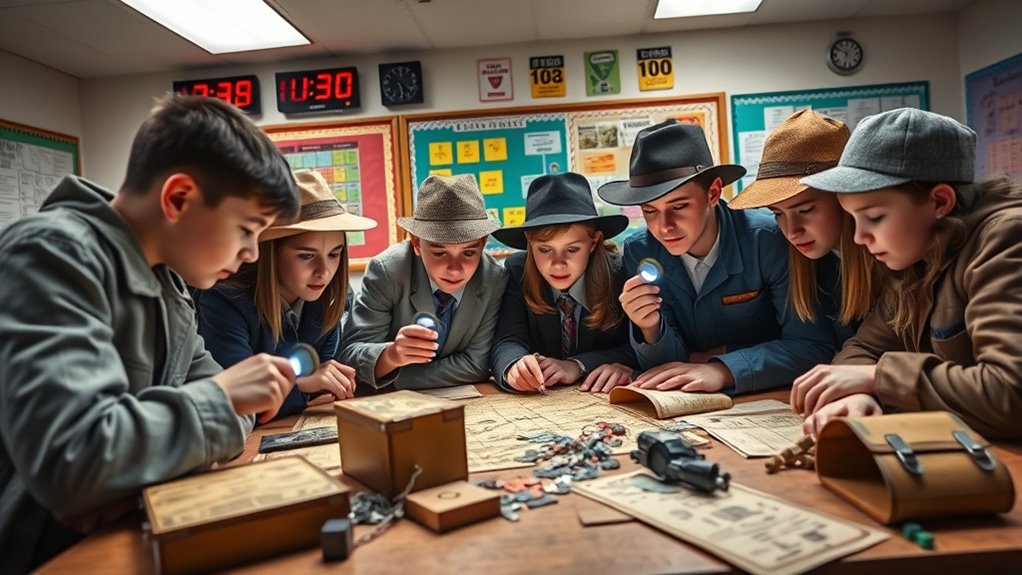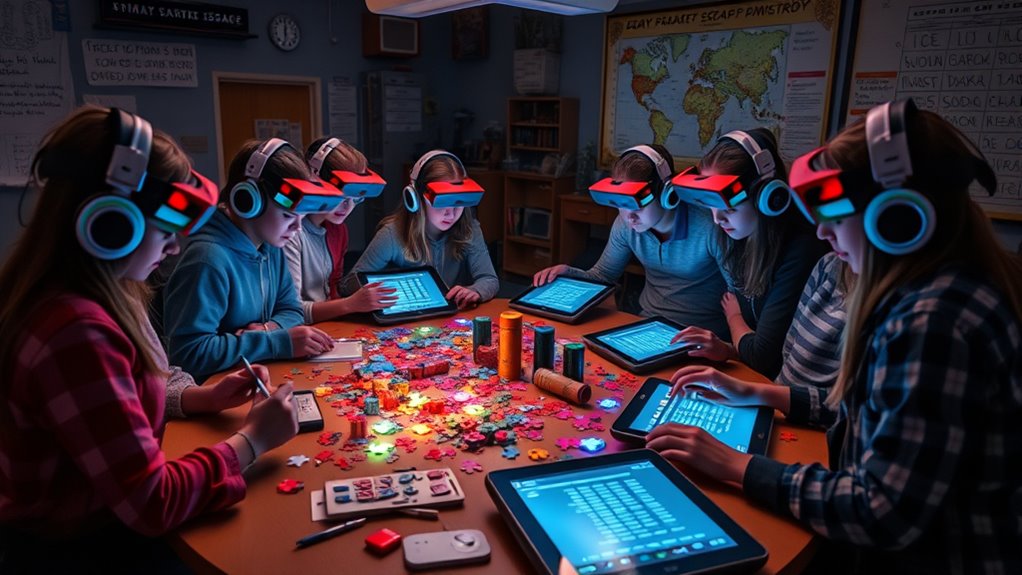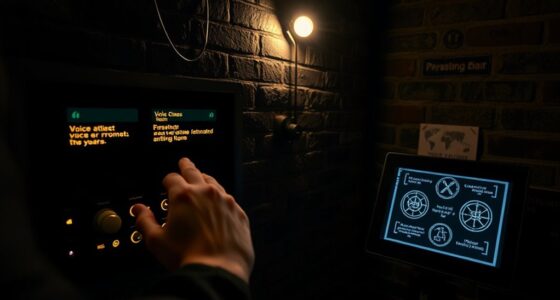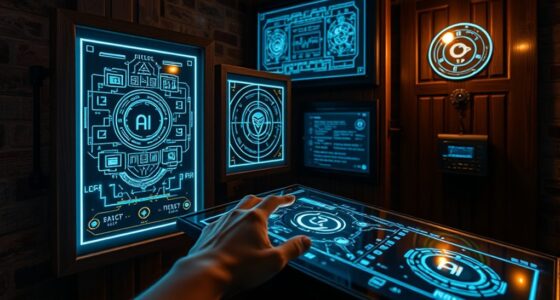Escape rooms are being used in education to turn learning into engaging, interactive experiences. By solving puzzles and working together, you develop essential skills like teamwork, critical thinking, and problem-solving. These activities make abstract concepts memorable and boost motivation, especially with themes like anime to keep students interested. As you explore these innovative methods, you’ll see how they foster collaboration and a growth mindset, revealing new ways to enhance education—keep going to discover more.
Key Takeaways
- Educators incorporate escape rooms to promote teamwork, critical thinking, and problem-solving skills through interactive, experiential learning activities.
- Teachers use themed escape rooms, including anime-inspired scenarios, to increase student motivation and engagement.
- Escape rooms help reinforce curriculum concepts by providing hands-on challenges that make abstract ideas tangible and memorable.
- They foster collaboration, communication, and trust among students, improving social skills and group dynamics.
- Schools leverage escape rooms for formative assessment, offering immediate feedback and encouraging a growth mindset.

Escape rooms have become an innovative tool in education, transforming traditional learning into an engaging and interactive experience. As a student or educator, you’ll find that these activities foster essential skills like team building and critical thinking, making learning both effective and enjoyable. When you step into an escape room, you’re immediately immersed in a challenge that requires collaboration, communication, and problem-solving—all indispensable components for success in any academic or professional setting.
Escape rooms revolutionize education by fostering teamwork, critical thinking, and engaging problem-solving in an interactive environment.
In the context of education, escape rooms serve as dynamic environments where students learn to work together toward a common goal. Instead of passively absorbing information, you actively participate in solving puzzles, deciphering codes, and uncovering clues. This process naturally promotes team building because you must rely on your peers’ strengths and perspectives to progress. You’ll discover that effective communication and trust are indispensable to overcoming obstacles, which translates well into classroom projects and future workplace scenarios. As you navigate through the room, you develop a sense of camaraderie and shared purpose, reinforcing the importance of collaboration in real-world situations.
Critical thinking is another core skill sharpened through escape room activities. You’re encouraged to analyze complex problems, evaluate options, and make quick decisions under pressure. For example, you might encounter a puzzle that requires logical reasoning or a pattern recognition challenge that tests your ability to think outside the box. These scenarios compel you to approach problems from multiple angles, fostering creativity and adaptability. The immediate feedback from the environment helps reinforce learning, as you see firsthand how different strategies can lead to success or failure. This experiential approach makes abstract concepts tangible and memorable, helping you retain knowledge more effectively.
Furthermore, incorporating anime-inspired themes into escape rooms has been shown to increase student engagement and motivation, especially among fans of the genre. Moreover, escape rooms challenge you to stay focused and manage your time efficiently, skills that are indispensable in academic settings. They push you to balance attention to detail with the need for swift decision-making. As you collaborate with others, you learn to delegate tasks, listen actively, and respect diverse viewpoints—all important traits for effective team building. The sense of accomplishment when you finally escape the room boosts confidence and motivation, encouraging a growth mindset. In this way, escape rooms don’t just teach content; they cultivate a mindset geared toward continuous learning and problem-solving.
Frequently Asked Questions
How Do Escape Rooms Improve Critical Thinking Skills?
Escape rooms boost your critical thinking by challenging you to solve problems quickly and creatively. As you work through puzzles, your problem solving skills sharpen, helping you analyze situations more effectively. The experience also enhances collaboration, encouraging you to communicate and share ideas with others. This teamwork pushes you to think critically under pressure, making escape rooms a fun way to develop essential skills that transfer to real-world scenarios.
Are Escape Rooms Effective for All Age Groups?
You’ll find escape rooms can be a vibrant puzzle box for all age groups, sparking curiosity like a lighthouse guiding diverse learners. They offer age-specific engagement, tailoring challenges to suit children, teens, or adults. However, inclusivity considerations matter—modifying difficulty levels or themes guarantees everyone feels welcome. When thoughtfully designed, escape rooms become a universal tool, transforming learning into an adventure that unites and inspires across generations.
What Are the Costs Associated With Implementing Escape Rooms?
You should consider your budget considerations and equipment expenses when implementing escape rooms. Costs can include purchasing or creating puzzles, props, and technology, along with space setup. You might need to invest in locks, timers, and themed decorations, which can add up quickly. Planning ahead helps you manage these expenses effectively, ensuring the escape room fits within your budget while providing an engaging learning experience for students.
How Do Teachers Assess Student Progress in Escape Room Activities?
You assess student progress in escape room activities through peer assessment and progress tracking. As students work together, you observe their problem-solving skills, teamwork, and understanding of concepts. You can have them evaluate each other’s contributions or complete reflection sheets. Additionally, you track their success rates, time taken, and the strategies used, which helps you gauge individual and group learning, ensuring they meet learning objectives effectively.
Can Escape Rooms Be Adapted for Virtual or Remote Learning?
Yes, you can adapt escape rooms for virtual or remote learning by creating digital puzzles and challenges that students can solve online. Use platforms like Google Forms, breakout rooms, or interactive tools to foster remote engagement. Design activities that require collaboration, critical thinking, and problem-solving, so students stay motivated and connected. Virtual adaptation makes it possible to maintain the excitement and teamwork of escape rooms, even when learners are apart.
Conclusion
As you step into the world of education, imagine unfastening potential just like in an escape room. These immersive experiences turn learning into an adventure, transforming challenges into opportunities. Don’t let traditional methods lock you in—embrace the excitement of interactive learning. After all, isn’t education about opening doors to new possibilities? By incorporating escape room techniques, you hold the key to inspiring curiosity and fostering success in every student.









